The Rise and Fall of George Best
@Asim Deb
“The man could never play in FIFA World Cup final rounds, neither in European Championship, as his country Northern Ireland could never qualify. But he was voted 8th in the World Soccer’s 100 greatest of the 20th century”.
Manchester United manager Matt Busby receives a telegram from his club scout Bob Bishop: “I think I’ve found you a genius.” The “genius” was a 15 year boy George Best, whom Bob Bishop discovered in Belfast, Ireland. Just recently, the boy’s local club Glentoran had rejected him for being “too small and light”. George was subsequently given a trial and signed up by Manchester United’s Chief Scout Joe Armstrong. Too little a boy, George became homesick and stayed for only two days. Afterwards he returned to Manchester and spent two years as an amateur, as English clubs were not allowed to take Northern Irish players as apprentices. He was given a job as an errand boy on the Manchester Ship Canal, allowing him to train with the club twice a week.
That was the beginning. The 15 year boy, who unfortunately could never play in the FIFA World Cup Final rounds or even European Championship (as his country Northern Ireland could never qualify), but later became:
1. Voted 8th in the World Soccer 100 greatest football players of the 20th century election in 1999.
2. Voted 16th in the IFFHS World Player of the Century election in 1999
3. He was one of the only six men of the BBC’s Sports Personality of the Century in 1999.
4. Voted 19th in the public UEFA Golden Jubilee Poll, in 2004
5. Brazilian footballer Pelé stated, “George Best was the greatest player in the world”.
6. “George Best was one of the most talented players of all time and probably the best footballer who never made it to a major world final.” Said Franz Beckenbauer.
7. Dutch captain Johan Cruyff commented: “What he [Best] had was unique, you can’t coach it”.
8. The Irish Football Association described him as the “greatest player to ever pull on the green shirt of Northern Ireland”.
9. On his 60th birthday, Belfast City Airport was renamed the George Best Belfast City Airport.
10. According to the BBC, Best was remembered by mourners at his public funeral held in Belfast as “the beautiful boy” [with a] “beautiful game”.
11. His native Northern Ireland considered him the finest player to ever take the field: “Pelé good; Maradona better; George Best.”
*******
“He was too much of a perfectionist. I think that was his problem after 1968/69. He wanted to be number one. Being number two was absolutely mournful for him and being three or four — as Manchester United then were — was absolute pain. He couldn’t cope with that. He had this absolute obsession — this need to be perfect and to go and win every game.”
“He said he never wanted a game to end if he was playing well. And he never wanted it to end if he was playing badly. If he was playing well, then he wanted to go and get some more goals. If he was playing badly, then he just wanted to do one thing — either score a goal or make a goal, which would send people home happy. He just couldn’t get his head around the fact that he wasn’t playing for the number one side in the country.”
“The fact is that after 1968 and Wembley, he thought that Manchester United would be the next Real. He thought they would continue to win the European Cup. He thought they would be built around him. He thought his peak would come at 29 years old. And he thought he would carry on winning medals. Because that’s virtually what he had done every season since he’d made his debut.”
*******
George Best (22 May 1946 – 25 November 2005) from Northern Ireland played mainly for Manchester United and the Northern Ireland national team. In 1968, his club Manchester United won the European Cup and he was named the European Footballer of the year and FWA Footballer of the Year. He was club’s top goal scorer in the league for five consecutive seasons.
After 14 September 1963, at the age of 17 making his debut for Manchester United against West Bromwich Albion at Old Trafford, he scored 179 goals from 470 appearances over 11 years. In 1974 he unexpectedly quit United at age 27, but returned to football for a number of clubs around the world in short spells, until retiring in 1984, age 37. In international football, he was capped 37 times and scored nine goals between 1964 and 1977, although a combination of the team’s performance and his lack of fitness in 1982 meant that he never played in the finals of a European Championship or World Cup.
George scored his first goal for the first team on his second appearance in a 5–1 win over Burnley. In 1963–64 Manchester United finished second under manager Matt Busby, four points behind Liverpool. That same season, George and his Manchester United won the 1964 FA Youth Cup, the sixth FA Youth Cup win under the management of Jimmy Murphy, and the first since 1958. In the next season 1964-65, his first full season as a first team regular, George and Manchester United won the league title.
On 9 March 1966, the rising star of English football, George earned a superstar status at the age of 19 when he scored two goals in a European Cup quarter-final match against Benfica at the Estádio da Luz. The Portuguese media dubbed him “O Quinto Beatle”, (“the fifth Beatle” in English), and on the team’s return to England George was photographed in his new sombrero with the headline, “El Beatle”. His football skill and the showmanship made him a crowd and media favourite, and he moved from the back pages headlines to the front pages. Other nicknames included the “Belfast Boy”, and he was often referred to as Georgie, or Geordie in his native Belfast.
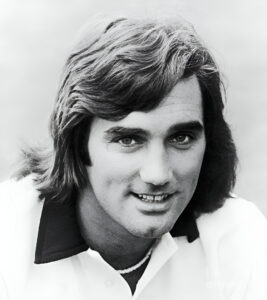
However United failed to win any major honours in the 1965–66 season, and George was injured with a twisted knee following a bad tackle from a Preston North End player. His club kept him off the field for the rest of the campaign but George had little faith in the United medical staff, and so he secretly met physiotherapist, who readjusted his ligaments in a painful procedure. His last game of the season, his knee strapped-up, came on 13 April, and ended in a 2–0 defeat to Partizan Belgrade at Partizan Stadium.
George then had a successful season of 1966–67, as Manchester United claimed the league title by four points. Best stated that “if the championship was decided on home games we would win it every season.” George scored twice against rivals Liverpool in a 2–0 win at Anfield, and also claimed a hat-trick over Newcastle United in a 6–0 home win on the season’s penultimate league. However a home defeat to local rivals Manchester City proved costly, as City claimed the league title with a two-point lead over United.
Yet the 1967–68 season would be remembered by United fans for the European Cup win. In the quarter-finals United defeated Polish club Górnik Zabrze 2–1 on aggregate. Despite losing the away tie 1–0, George described the defeat as “one of our best-ever performances, given all the unwelcome circumstances”. Facing 6 times champions Real Madrid in the semi-finals, George scored the only goal with a 15-yard strike that Alex Stepney described as one of Best’s finest goals. In the tie at Bernabéu, George was marked effectively by Manuel Sanchís Martínez, but just for once George got the better of him he made a telling cross to Bill Foulkes, who calmly found the net to level the game at 3–3 and to win the aggregate tie 4–3.
George Best was described by Geoffrey Green of The Times as “the centrepiece of the chessboard … a player full of fantasy; a player who lent magic to what might have been whimsy”.
The attacking combination of George Best, Bobby Charlton and Denis Law became popular as “the holy trinity”. George was the youngest, Bobby Charlton was ten years senior, and Scotland striker Denis Law was an established international who had signed for a British transfer record fee £115,000 in 1962.
That season, George was the First Division’s joint top-scorer (28 goals with Southampton’s Ron Davies) and became the youngest ever recipient of FWA Footballer of the Year award. Facing United in the European Cup Final at Wembley were Benfica; whilst his teammates rested, Best found “a novel way to relax” before the big game by spending time with “a particular young lady called Sue”. The game went into extra-time, and just three minutes into extra-time Best went on a mazy run and beat goalkeeper José Henrique with a dummy, before rolling the ball into the net; two further goals from Brian Kidd and Bobby Charlton settled the tie at 4–1. Best also won the Ballon d’ Or in 1968 after receiving more votes than Bobby Charlton, Dragan Džajić and Franz Beckenbauer. This meant that he had won the three major honours in club football at the age of just 22 (the league title, European Cup, and European Player of the Year award).
And then, his steady decline began.
The ‘holy trinity’ of George Best, Law and Charlton remained effective in the 1968–69 campaign. George later said “I increasingly had the feeling that I was carrying the team at times on the pitch.” He scored 22 goals in 55 games. In the Intercontinental Cup, Best said “no one tackled harder or dirtier than this Argentinian team” as a 1–0 defeat at the Estadio Camilo Cichero was followed by a 1–1 draw at Old Trafford. In the home tie, Best was kicked and spat on by José Hugo Medina, and both players were sent off after Best reacted with a punch. Despite their poor league form, United managed to reach the semi-finals of the European Cup (had a relatively easy run in getting past Ireland’s Waterford United, Belgium’s Anderlecht and Austria’s Rapid Wien) where they were knocked out 2–1 on aggregate by A.C. Milan following a 2–0 defeat at the San Siro; Milan goalkeeper Fabio Cudicini was the hero after keeping United to only one goal at Old Trafford.
In 1969-70, United under a new manager Wilf McGuinness, could manage an eighth-place finish. George made 23 goals, including an FA Cup record six goals in an 8–2 win over Northampton Town in a mud-bath at the County Ground on 7 February 1970.
He scored 6 goals in a Cup game against Northampton Town in 1970. He is reported to have said after the game: “I felt so embarrassed I played the last 20 minutes at left-back.”
Matt Busby returned as United manager in December 1970, but the 1970–71 season ended without a trophy. George began to get into trouble with his discipline: fined by the Football Association for receiving three yellow cards for misconduct, and he was suspended by United for two weeks after missing his train to Stamford Bridge so as to spend a weekend with actress Sinéad Cusack.
On 15 May 1971, George scored possibly the most famous “goal” of his career at Windsor Park in Belfast against England. Gordon Banks, the English goalkeeper released the ball in the air in order to kick the ball. However, George had anticipated the move and managed to knock the ball up in the air behind Gordon Banks. The ball went high over their heads and heading towards the open goal. Best outpaced Banks and headed the ball into the empty goal, but the goal was disallowed for “non-gentleman behaviour” by referee Alistair Mackenzie. Interestly the referee could not see it as his back had been turned away from the incident.
In 1971–72 Manchester United earned an 8th place finish with new manager Frank O’Farrell. George had hat-tricks against West Ham United and Southampton However, he was also sent off against Chelsea, was the subject of death threats, and failed to turn up for training for a whole week in January as he instead spent his time with Miss Great Britain 1971, Carolyn Moore. On 17 November, he was the subject of Eamonn Andrews’s “This Is Your Life” when he was surprised at a central London restaurant. With 27 goals in 54 appearances, George was the club’s top-scorer for the sixth – and final – consecutive season. George Best then announced his retirement from football, but nevertheless turned up for pre-season training, and continued to play.
United’s decline continued in 1972–73 season. Frustrated with the club’s decline, George went missing in December to party at the London nightclubs.
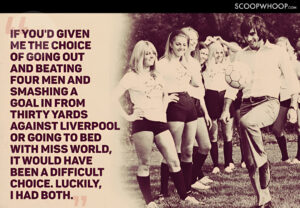
He was suspended, and transfer-listed at a value of £300,000. After O’Farrell was replaced as manager by Tommy Docherty, Best announced his retirement for a second time. However, he again resumed training on 27 April.
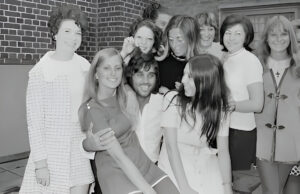
George Best’s last competitive game for the club was on 1 January 1974 against Queens Park Rangers at Loftus Road, which United lost 3–0. He failed to turn up for training three days later and was dropped by Docherty, though he claimed Docherty was deceitful with him. He was arrested and charged with stealing a fur coat, passport, and cheque book from Marjorie Wallace, but was later cleared of all charges. Manchester United suffered relegation into the Second Division in 1973–74.
The Belfast boy, found to be “genious” at the age of 15, left Manchester United in 1974, effectively ending his career at the highest level so unfortunately at the age of only 27.
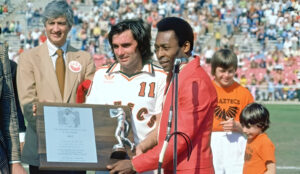
From 1963 till 1974, George Best made 470 appearances for Manchester United in all competitions and scored 179 goals. Over the next decade he went into an increasingly rapid decline, drifting between several clubs, including spells in South Africa, the Republic of Ireland, the United States, Scotland, and Australia. A brief:
Clubs: Manchester United, Los Angeles Aztecs, Fulham, Fort Lauderdale Strikers, Hibernian, San Jose Earthquakes, a.o.
Trophies (Manchester United):
European Cup (1968), English Championship (1965, 1967), Charity Shield (1965, 1967)
Honours:
European Footballer of the Year (1968), English Player of the Year (1968), Top scorer English League (1968)
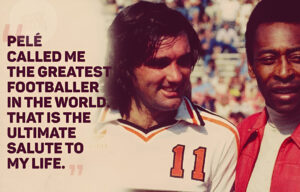
Diego Maradona has frequently named Best as his all-time favorite player. In 1988, a testimonial match was held for Best at Windsor Park, Belfast. Amongst the crowd were Sir Matt Busby and Bob Bishop, the scout who discovered Best, while those playing included Argentine star Ossie Ardiles, Pat Jennings, and Liam Brady. Best scored twice, one goal from outside the box, the other from the penalty spot. In 1998, Best became a football pundit on Sky Sports. In November 2004 he agreed to join English Premier League club Portsmouth Football Club as a youth coach, citing his desire to get involved in football again.
The Guardian’s David Lacey writes:
“George Best was the outstanding British footballer of his generation and that, many would argue, is a gross understatement, for he had plausible claims to be considered the greatest of any generation. Naturally athletic, tough, confident and blessed with genius, his career was one of the brightest stars of its generation. His gifts were legendary.”
George Best capped 37 times for his country Northern Ireland, scoring nine goals. Of his nine international goals four were scored against Cyprus and one each against England, Turkey, Albania, Scotland and Switzerland. He was considered briefly by manager Billy Bingham for the 1982 World Cup, but at the age of 36, with his football skills dulled by age and drink (and five years having passed since his last cap), he was not selected for the Northern Ireland squad.
Following years of alcoholism that led to a liver transplant in 2002, George Best died at London’s Cromwell Hospital on November 25, 2005, from multiple organ failure.
******
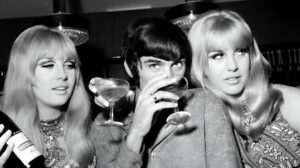
The world’s first so popular rock-n-roll celebrity footballer, earning the nickname “El Beatle” in 1966 at so early age and just at the beginning of a sports carrer, his subsequent extravagant lifestyle most notably alcoholism made him suffer for the rest of his life. His rock-n-roll celebrity looks and personality to ensure his popularity went beyond football and into the world of entertainment. Along with Manchester City midfielder Mike Summerbee, they opened a chain of fashion boutiques, and George then also went into the bar and nightclub business, as well as earning extra money from a string of sponsorships and endorsements. Pop Star looks, a dedication to fashion and a reputation as a playboy meant George Best a figure of fascination for the public in the swinging sixties. He said of his career: “I spent a lot of money on booze, birds [women] and fast cars – the rest I just squandered”. He had a liver transplant in 2002 but continued drinking even after the transplant.
In the ’60s, at the most what he was earning as a footballer was £250, and that was in his final year at Manchester United. But from the commercial endorsements, he was the first brand footballer really. Between 1966 and 70, he had his names in 78 different brands — everything from shoes to fashion to breakfast cereal to bedding, he was earning about £100,000 a year by 1969, which was a phenomenal amount. No footballer could earn so much of fame by playing for only seven or eight seasons at football’s highest competitive level. But the end was so tragic.
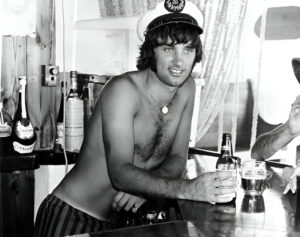
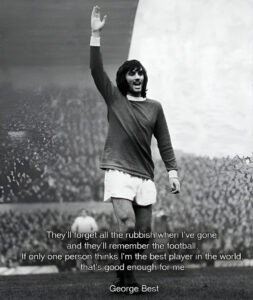
Sources:
Biography.Com
Football-History.Net,
The Guardian,
George Best interview,
Wikipedia,
Encyclopedia.
“It seems impossible to hurt him. All manner of men have tried to intimidate him. Best merely glides along, riding tackles and brushing giants aside like leaves.”
— Joe Mercer, Manchester City manager, 1969.
“It’s been a joke on the circuit ever since. You know, I’m on one side of the street, George Best is on the other. He nods to me and I dive under a bus.”
— Northampton goalkeeper Kim Book laughs about the jibes he has faced since being fooled by Best’s feint in the 1970 FA Cup game against Manchester United.
http://www.the42.ie/george-best-interview-duncan-hamilton-1085776-Apr2015/
https://www.biography.com/people/george-best-9211159
http://www.football-history.net/who-is-who/b/george-best.htm
http://www.nationalfootballmuseum.com/halloffame/george-best
https://www.theguardian.com/football/2005/nov/25/sport.obituaries2
https://en.wikipedia.org/wiki/George_Best
http://www.newworldencyclopedia.org/entry/George_Best
******

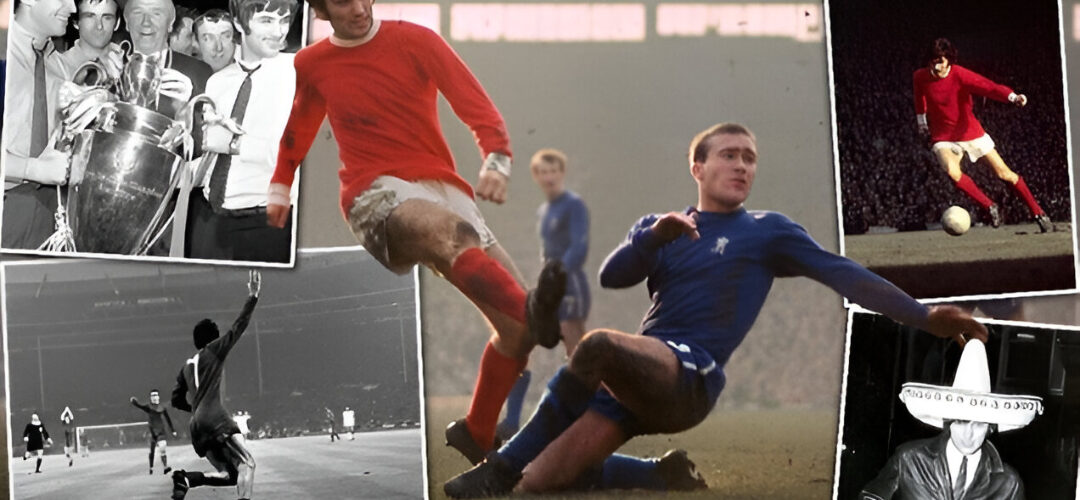

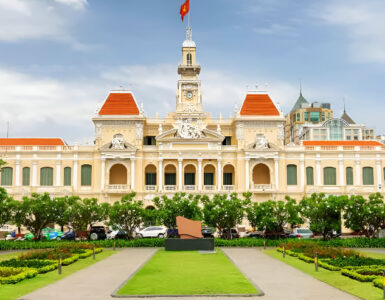
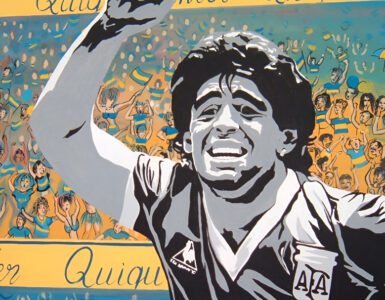









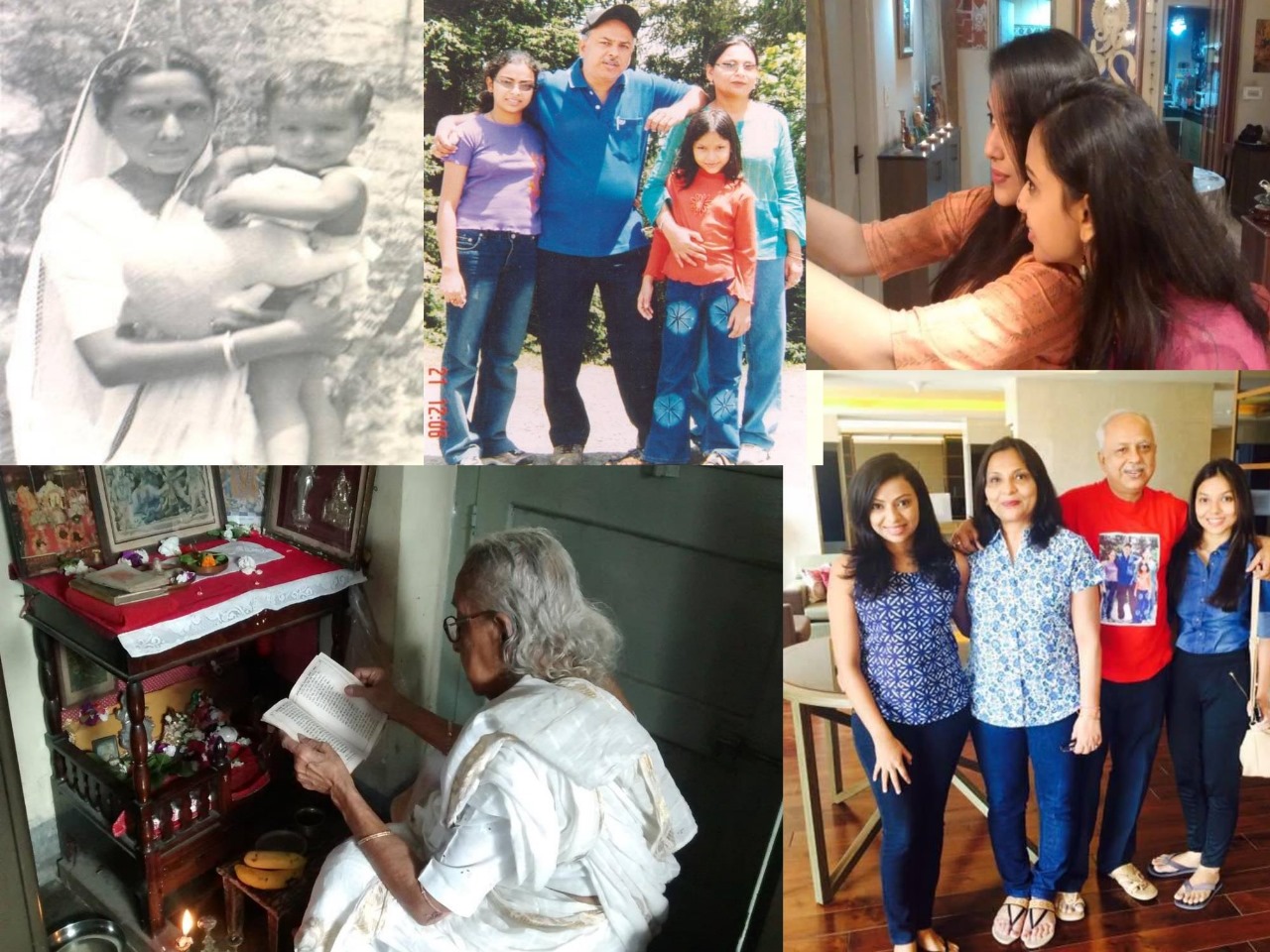
On the ground,
Pele “good”, Maradona “better”, George “best”.
Unfortunate that such talent could not play in the final rounds of any FIFA Cup.
Hmmm it appears like your bpog ate my first comment (it
was extremely long) so I guess I’ll just sum it up what I wrote and
say, I’m thoroughly enjoying your blog. I as well am an aspiring
blog writer but I’m still new to everything.
Do you have any points for beginner blog writers?
I’d really appreciate it. http://boyarka-inform.com/